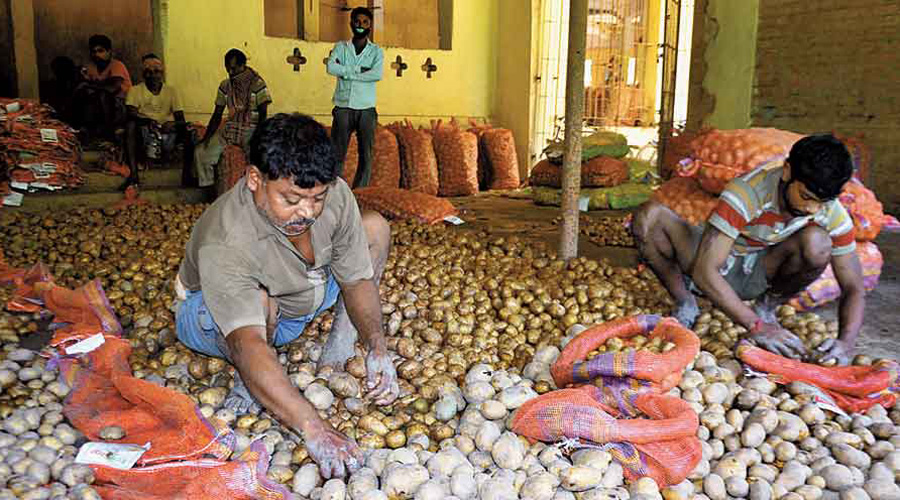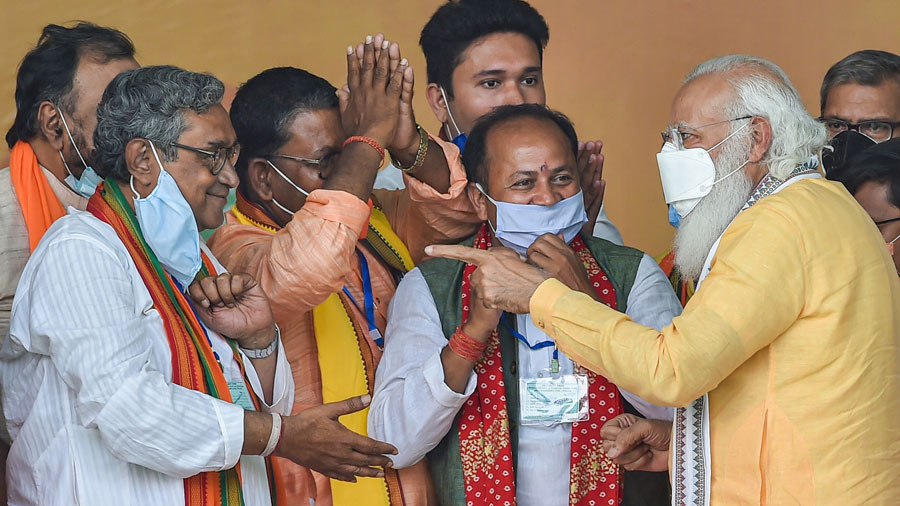A mix of steps taken by the Mamata Banerjee government has helped potato farmers in Bengal hold onto their produce till they get a fair price without falling into the trap of moneylenders or going for distress sale.
With large sections of the state’s 15 lakh-odd potato farmers welcoming the initiatives of the government, such as buying stocks from peasants and issuing Kisan Credit Cards, the Trinamul Congress is hoping to reap dividends in the Assembly elections in the potato belt of Hooghly, East Burdwan, Birbhum, West Midnapore and parts of Murshidabad.
At a time when Bengal’s cold storages are brimming with potatoes following a bumper crop, reports have reached the state government that 70 per cent of these stocks are owned by farmers themselves. This means that the majority of the farmers did not have to sell their produce to middlemen from the field itself.
“This is significant. This shows that the farmers have felt encouraged to hold onto their produce till they get a better price over the next few months. Earlier, the farmers felt forced to go for distress sale after bumper production. Middlemen reaped the benefits by buying potatoes at a cheap rate and selling them at a higher price by hoarding stocks in cold stores,” said a senior state government official.
This year, the agriculture marketing department has estimated that 115 lakh tonnes of potatoes were produced in Bengal against an average annual harvest of 90 lakh tonnes.
“If the farmers did not sell their produce at a much lower price despite the surplus production, it suggests that they are now in a better position financially,” a bureaucrat said.
Initially, the picture had been worrisome for the ruling establishment as the price of potatoes had gone down to Rs 4 a kilo in mid-February when farmers had begun harvesting. They had been in deep trouble as the input cost was estimated to be Rs 5 for producing a kilo of potato.
Reacting with alacrity, the Trinamul government on February 23 decided to buy 10 lakh tonnes of potatoes at Rs 6 a kilo to give the farmers some relief. While Bengal has 15 lakh potato farmers, around 60 lakh people are dependant on the cultivation of the tuber.
“The potato-producing districts such as Hooghly, East Burdwan and Birbhum have been Trinamul bastions since 2009. If the party faces trouble in these districts, it would find it difficult to retain power in a closely fought battle. It appears that several government schemes initiated over the past 10 years have now started yielding results,” said an agriculture department official.
Officials in the department said the issuance of Kisan Credit Cards had been instrumental in giving farmers a sense of security, enabling them to hold onto their produce till they got a fair price.
“Nearly 80 per cent of the potato farmers are now covered under the KCC, under which they get easy farm loans from banks. They don’t have to depend on moneylenders, who charge bloated interest rates. This is the reason why they can wait for a better price,” a source said.
Another official pointed to the state government’s initiative to lay stress on paddy procurement.
“We start procurement in early November when the kharif crop is harvested. As farmers sold their produce at a much better price, they could invest in potatoes without depending on moneylenders,” the official said.
Sources said that as the Trinamul government had increased the paddy procurement target to 42 lakh tonnes from 15 lakh tonnes during Left Front rule, the farmers have a cushion.
Farmers said they had benefited from the government’s schemes but added that the state should now help them to sell their produce from the cold storages.
“I have kept 2 tonnes of potatoes in the store. I can hold onto the produce for another three months. It is expected that I will be able to sell the produce at Rs 12 to Rs 14 a kg. It would be good if the government helps us to send our produce to other states in case the price is low in Bengal. Some kind of transport subsidy will also help,” said Milan Kumar, a potato farmer from Tarakeswar in Hooghly.
Another farmer, Sarathi Roy from Memari in East Burdwan, said he had decided to keep 1 tonne of potatoes in the cold storage as the price had come down to Rs 4 a kg in February-end. “Had I been forced to sell the produce at that price, I would have incurred a huge loss. Thanks to the Kisan Credit Card, I could secure a loan on easy terms, which helped me to keep my produce in the store for a few months,” Roy said.
On the campaign trail, Trinamul has been highlighting the government’s efforts to provide financial stability to farmers in the rural belt of Hooghly, East Burdwan and Birbhum. “It is true that the state government has helped us in many ways. But it would have been better if more cold storages had come up in the potato belt. The government should think about it,” said Rishi Adak, a farmer in Birbhum’s Labhpur.
While Prime Minister Narendra Modi has been promising to set up more cold storages in the potato-producing districts in his election rallies, Trinamul leaders say they have been working towards that end for the past few years.
“If Bengal can store more potatoes, it can serve the neighbouring states such as Jharkhand, Odisha, Assam, Chhattisgarh and Andhra Pradesh in the dry season. As we don’t have a proper export policy and storage capacity, the markets are often captured by states like Uttar Pradesh and Gujarat that have better infrastructure,” an official said.












